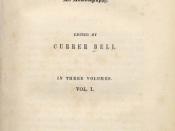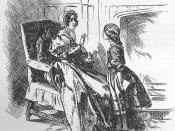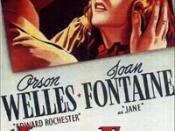Jane Eyre The length of a character's appearance in a novel does not necessarily reflect on their significance. In Charlotte BrontÃÂø's fictional autobiography, Jane Eyre, Helen Burns proves to be a significant character in spite of her short appearance. Helen both directly and indirectly affects Jane Eyre and Mr. Rochester.
Helen Burns' short appearance in Jane Eyre directly affects Jane's ways of thinking and perceiving the world around her. Helen has an overwhelming sense of peace about her that she radiates to Jane during their stay at Lowood School. Helen teaches Jane about forgiveness and understanding, lessons that would help Jane out later in life. Second, Helen is a "heavenly"ÃÂ figure who looks to God for advice before anyone else. These actions capture Jane's attention and allow her to be drawn to Helen. Jane loves and respects Helen's ability to forgive and forget. She takes the harsh life at Lowood with ease and does not have even a hint of hatred over Miss Scatcherd's horrible treatment.
In one instance from the novel, Mr. Brocklehurst reprimands Jane for breaking her slate. While Jane accepts her punishment without resistance, she shows how she has adopted Helen's attitudes. Jane radiates Helen's feelings of forgiveness, acceptance, and understanding. As Helen walks by and looks at Jane, Jane refers to Helen as a "martyr"ÃÂ and a pillar of strength. Helen's example allows Jane to look beyond her own situations and predicaments to see a greater life with God. Jane's spiritual development is also affected by Helen in another way. When Jane's aunt Reed is on her deathbed, Jane goes to be by her side. Since Jane has left Lowood and been influenced by Helen, she chooses to forgive her aunt for her harsh treatments. While living with the Reed's, Jane endured harassment from her aunt and cousins. Instead of reacting to her aunt's earlier harsh treatments in a negative way, Jane is kind and comforting so she can make her aunt's last moments of life as comfortable as possible. Furthermore, with inspiration from Helen, Jane learns to accept reason over passion. This way of thinking is apparent when Jane rejects Mr. Rochester's proposal to be his mistress. She loves Mr. Rochester, but she knows that he is married and that it is extremely wrong to be his mistress. Jane's acceptance of reason over passion shows when she rejects St. John's marriage proposal. She knows that she is not in love with him and that she can not marry someone with whom she is not in love. Through Helen's acceptance, forgiveness, and understanding, she proves that a significant character does not have to be a main character.
Edward Rochester is another character whose development is affected by Helen Burns. Though Helen Burns does not affect Rochester directly, he is affected indirectly through Jane's actions and influence on Jane's personality. Jane's forgiving, understanding, and nonresistant attitudes attract Mr. Rochester. Rochester's tough and unforgiving nature seems to be a foil for Jane's own attitudes. Rochester first shows his change in attitude when Jane asks a leave of absence to be with her dying aunt. Instead of arguing with her to stay, he allows her to go, showing his first signs of caring and compassion for Jane. His loving feelings are very much like Helen's own feelings of compassion for others. When Jane's leave, which is supposed to last a week, lasts almost a month, Mr. Rochester is not enraged. He is only content that Jane has returned safely. The most obvious sign that Helen Burns indirectly affects Rochester's development is in the later chapters of the novel. When Rochester's mansion goes up in flames, he returns to the inferno to rescue his servants. He suffers an injured arm and vision loss in one eye. His rescues are prime evidence that Jane affects Rochester with her selflessness and loving attitudes acquired from Helen. After several strange events that lead Jane back to Rochester, he finally shows her true love and compassion. These feelings are finally expressed in the truest form when Jane and Rochester are finally married. Helen's beliefs and attitudes were shown through Jane when she rejects Rochester's proposals to be a mistress. Rochester realizes that he needs to be true to himself and to those around him, just like Jane is. Jane's strength is influential on Rochester. Rochester's change in attitude and development show that Helen Burns is a significant character in Jane Eyre.
Helen Burns' influence upon Jane Eyre and Mr. Rochester extends far beyond her short appearance in Jane Eyre. Her attitudes and beliefs help to shape the spiritual and mental developments of Jane and Rochester. Helen Burns' presence in Jane Eyre proves that an influential character does not have to appear in the novel for long period of time in order to play a significant role.





